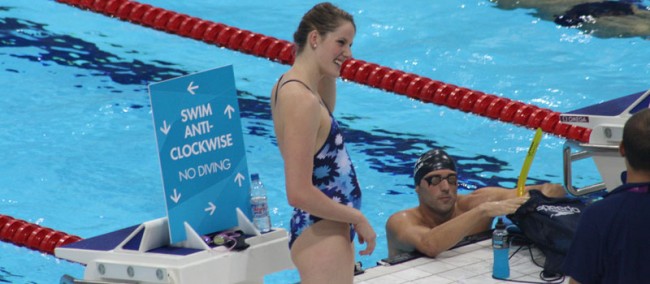Despite the near-nudity of its participants, swimming is not the world’s most glamorous spectator sport. Gone are the days of Hollywood stars Esther Williams and Johnny Weissmuller. Twenty-first-century swimmers are unrecognizable aliens, clad in silicon goggles and caps, their faces submerged underwater. There are no close-ups of sweaty foreheads, no high-speed car crashes—the sport’s only allure is its participants’ speed, and now it is coming to terms with the loss of its most famous face.
Michael Phelps was competitive swimming’s biggest star since Mark Spitz’s mustache. His achievements are so stunning that the numbers start to become meaningless: 39 world records; 18 Olympic gold medals, eight of which he won during a single Games. He excelled at all strokes and (nearly) all distances, and he was able to rush back to the blocks within 10 minutes to do it all over again in multiple events. His career medal tally was also helped by an unusually early start for a male swimmer; his first world record was set in 2001, when he was only 15.
For a new swimmer to have similar effects on the sport will be difficult, surpassing his achievements even more so. After all, most people pay attention to swimming just once every four years, so Olympic success is a must.
Desperate journalists often try to clobber any promising multi-eventer with the tag of “the next Michael Phelps,” a tactic that always ends badly. Phelps’s teammate and longtime rival Ryan Lochte was the most logical successor. At last year’s London Games, Lochte could have collected seven golds; in the end he managed two, plus silvers and a bronze. An amazing feat, unmatched by any man bar Phelps himself—but thanks to the hype, it was seen as a disappointment. He remained in the spotlight by appearing on Saturday Night Live and 30 Rock and starting production on his reality show What Would Ryan Lochte Do?, but his critics wondered whether his medal results would have been different if he’d spent more time training and less time goofing around at photo shoots.
Others have tried and failed to follow in Phelps’s size-14 footsteps. At the 2008 Beijing Olympics, the USA had high hopes for medley and freestyle swimmer Katie Hoff, who entered five individual events (plus one relay). In the shadow of Phelps’s octo-triumph, her silver and two bronzes were taken as a sign she’d bitten off more than she could chew. After the Games, she moved 500 miles to Baltimore to train with Phelps, but did not qualify for London.
Being a multi-event swimmer is both incredibly difficult and the only way to get globally recognized. Or is it? If you’re a teenage girl, different rules apply.
• • •
“Katie [Ledecky], the girl who won the 800m, was 15… I did feel old at 23, it’s sad to say. Female distance swimming is getting a lot younger… I can’t compete with that. I can’t do the same level of work. I need more rest, more recovery.”
—Rebecca Adlington
Rebecca Adlington, Britain’s most successful Olympic swimmer for a century, retired at the beginning of February, making the British public even more hard-pressed to name a currently active swimmer. Adlington had certainly achieved every important goal: major titles at Olympic, World, Commonwealth and European level; a world record that has yet to be beaten; a guaranteed place for this year’s Strictly Come Dancing. Her high aerobic capacity and lactic acid tolerance helped her to sprint the last length of a grueling 16-lap race, but now that the next generation has arrived, Adlington feels she’s no longer competitive in the pool. [...]



